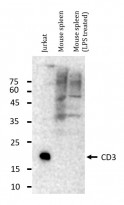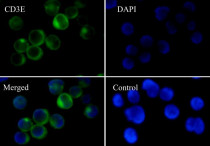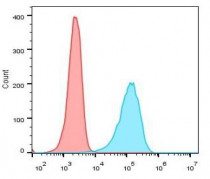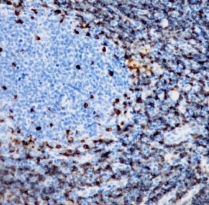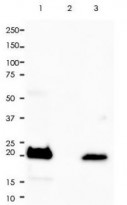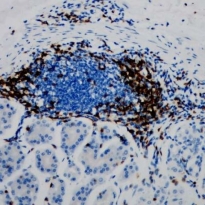ARG65859
anti-CD3 epsilon antibody [SQab1713]
anti-CD3 epsilon antibody [SQab1713] for Flow cytometry,ICC/IF,IHC-Formalin-fixed paraffin-embedded sections,Immunoprecipitation,Western blot and Human
Cancer antibody; Developmental Biology antibody; Immune System antibody; Lymphocyte Marker antibody; Inflammatory Cell Marker antibody; T-cell Marker antibody; T-cell infiltration Study antibody; Tumor-infiltrating Lymphocyte Study antibody

Overview
| Product Description | Recombinant Rabbit Monoclonal antibody [SQab1713] recognizes CD3 |
|---|---|
| Tested Reactivity | Hu |
| Tested Application | FACS, ICC/IF, IHC-P, IP, WB |
| Specificity | This antibody has been tested not reacting to mouse spleen lysates by WB. |
| Host | Rabbit |
| Clonality | Monoclonal |
| Clone | SQab1713 |
| Isotype | IgG |
| Target Name | CD3 epsilon |
| Antigen Species | Human |
| Immunogen | Synthetic peptide around the N-terminus of Human CD3 epsilon. |
| Conjugation | Un-conjugated |
| Alternate Names | CD3E; CD3 Epsilon Subunit Of T-Cell Receptor Complex; T-Cell Surface Glycoprotein CD3 Epsilon Chain; CD3e Antigen, Epsilon Polypeptide (TiT3 Complex); T-Cell Surface Antigen T3/Leu-4 Epsilon Chain; CD3e Molecule, Epsilon (CD3-TCR Complex); CD3-Epsilon; CD3epsilon |
Application Instructions
| Application Suggestion |
|
||||||||||||
|---|---|---|---|---|---|---|---|---|---|---|---|---|---|
| Application Note | IHC-P: Antigen Retrieval: Boil tissue section in Tris/EDTA buffer (pH 9.0). * The dilutions indicate recommended starting dilutions and the optimal dilutions or concentrations should be determined by the scientist. |
Properties
| Form | Liquid |
|---|---|
| Purification | Purification with Protein A. |
| Buffer | PBS, 0.01% Sodium azide, 40% Glycerol and 0.05% BSA. |
| Preservative | 0.01% Sodium azide |
| Stabilizer | 40% Glycerol and 0.05% BSA |
| Storage Instruction | For continuous use, store undiluted antibody at 2-8°C for up to a week. For long-term storage, aliquot and store at -20°C. Storage in frost free freezers is not recommended. Avoid repeated freeze/thaw cycles. Suggest spin the vial prior to opening. The antibody solution should be gently mixed before use. |
| Note | For laboratory research only, not for drug, diagnostic or other use. |
Bioinformation
| Database Links |
Swiss-port # P07766 Human T-cell surface glycoprotein CD3 epsilon chain |
|---|---|
| Gene Symbol | CD3E |
| Gene Full Name | CD3 Epsilon Subunit Of T-Cell Receptor Complex |
| Background | The protein encoded by this gene is the CD3-epsilon polypeptide, which together with CD3-gamma, -delta and -zeta, and the T-cell receptor alpha/beta and gamma/delta heterodimers, forms the T-cell receptor-CD3 complex. This complex plays an important role in coupling antigen recognition to several intracellular signal-transduction pathways. The genes encoding the epsilon, gamma and delta polypeptides are located in the same cluster on chromosome 11. The epsilon polypeptide plays an essential role in T-cell development. Defects in this gene cause immunodeficiency. This gene has also been linked to a susceptibility to type I diabetes in women. |
| Function | Part of the TCR-CD3 complex present on T-lymphocyte cell surface that plays an essential role in adaptive immune response. When antigen presenting cells (APCs) activate T-cell receptor (TCR), TCR-mediated signals are transmitted across the cell membrane by the CD3 chains CD3D, CD3E, CD3G and CD3Z. All CD3 chains contain immunoreceptor tyrosine-based activation motifs (ITAMs) in their cytoplasmic domain. Upon TCR engagement, these motifs become phosphorylated by Src family protein tyrosine kinases LCK and FYN, resulting in the activation of downstream signaling pathways. |
| Cellular Localization | Cell membrane, Membrane |
| Highlight | Related Antibody Duos and Panels: ARG30302 T-cell infiltration Antibody Duo ARG30325 Inflammatory Cell Antibody Panel ARG30334 Tumor-infiltrating Lymphocyte Antibody Panel Related products: CD3 antibodies; CD3 ELISA Kits; CD3 Duos / Panels; CD3 recombinant proteins; Anti-Rabbit IgG secondary antibodies; Related news: More effective cocktail therapy for cancer immune evasion Cholesterol, the weakness of anaplastic large cell lymphoma (ALCL) New antibody panels and duos for Tumor immune microenvironment Tumor-Infiltrating Lymphocytes (TILs) Exploring Antiviral Immune Response |
| Research Area | Cancer antibody; Developmental Biology antibody; Immune System antibody; Lymphocyte Marker antibody; Inflammatory Cell Marker antibody; T-cell Marker antibody; T-cell infiltration Study antibody; Tumor-infiltrating Lymphocyte Study antibody |
| Calculated MW | 23 kDa |
Images (7) Click the Picture to Zoom In
-
ARG65859 anti-CD3 epsilon antibody [SQab1713] WB image (Customer's Feedback)
Western blot: 20 µg of Jurkat and Mouse spleen (untreated or treated with LPS) lysates stained with ARG65859 anti-CD3 epsilon antibody [SQab1713] at 1:1000 dilution, overnight at 4°C.
-
ARG65859 anti-CD3 epsilon antibody [SQab1713] WB image (Customer's Feedback)
Western blot: 30 µg of Molt4 cell lysate stained with ARG65859 anti-CD3 epsilon antibody [SQab1713] at 1:500 dilution.
-
ARG65859 anti-CD3 epsilon antibody [SQab1713] ICC/IF image
Immunofluorescence: Jurkat cells were fixed with 4% paraformaldehyde for 30 min at RT, permeabilized with 0.1% Triton X-100 for 10 min at RT then blocked with 10% Goat serum for half an hour at room temperature. Samples were stained with ARG65859 anti-CD3 epsilon antibody [SQab1713] (green) at 1:50 and 4°C. DAPI (blue) was used as the nuclear counter stain. Control: PBS and secondary antibody.
-
ARG65859 anti-CD3 epsilon antibody [SQab1713] FACS image
Flow Cytometry: Jurkat cells were fixed with 4% paraformaldehyde for 10 min. The cells were then stained with ARG65859 anti-CD3 epsilon antibody [SQab1713] (blue) at 1:1000 dilution in 1x PBS/1% BSA for 30 min at room temperture, followed by Alexa Fluor® 488 labelled secondary antibody. Unlabelled sample (red) was used as a control.
-
ARG65859 anti-CD3 epsilon antibody [SQab1713] IHC-P image
Immunohistochemistry: Formalin/PFA-fixed and paraffin-embedded sections of Human tonsil tissue stained with ARG65859 anti-CD3 epsilon antibody [SQab1713] at 1:200 dilution. Antigen Retrieval: Boil tissue section in Tris/EDTA buffer (pH 9.0).
-
ARG65859 anti-CD3 epsilon antibody [SQab1713] IP image
Immunoprecipitation: 0.4 mg of Molt-4 whole cell lysate was immunoprecipitated (1:15 dilution) and stained with ARG65859 anti-CD3 epsilon antibody [SQab1713].
Lane 1: Immunoprecipitation in Molt-4 whole cell lysate
Lane 2: Rabbit IgG instead of Primary Ab in Molt-4 whole cell lysate
Lane 3: Molt-4 whole cell lysate, 10 µg (input) -
ARG65859 anti-CD3 epsilon antibody [SQab1713] IHC-P image
Immunohistochemistry: Formalin/PFA-fixed and paraffin-embedded sections of Human colon tissue stained with ARG65859 anti-CD3 epsilon antibody [SQab1713] at 1:200 dilution. Antigen Retrieval: Boil tissue section in Tris/EDTA buffer (pH 9.0).
Customer's Feedback
